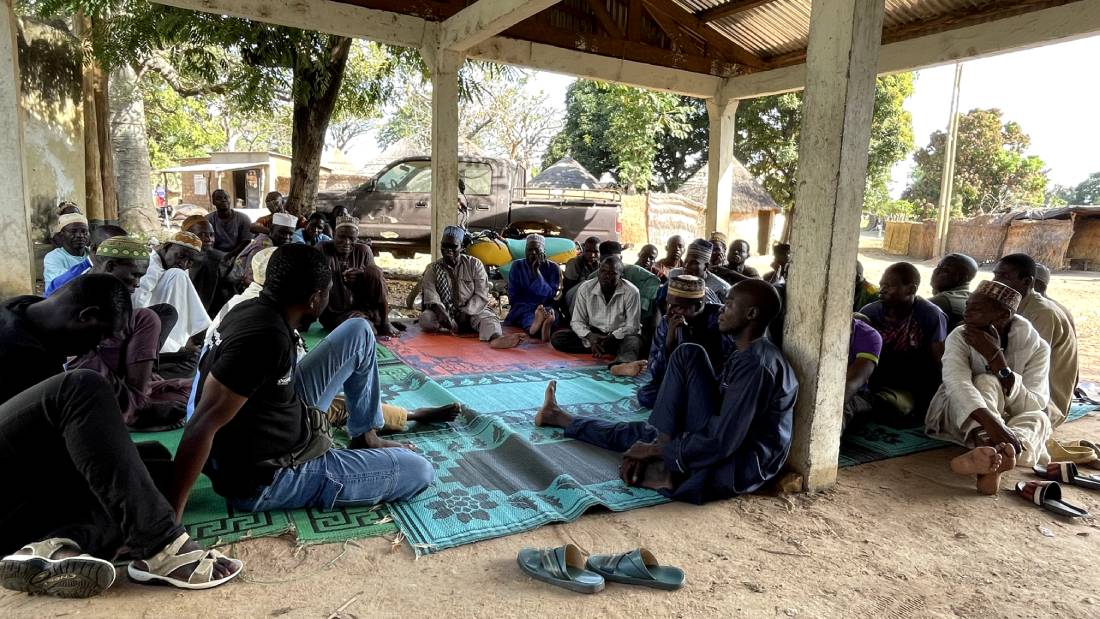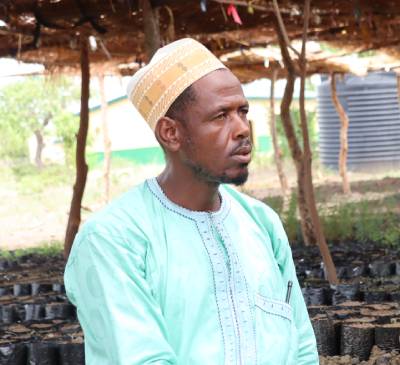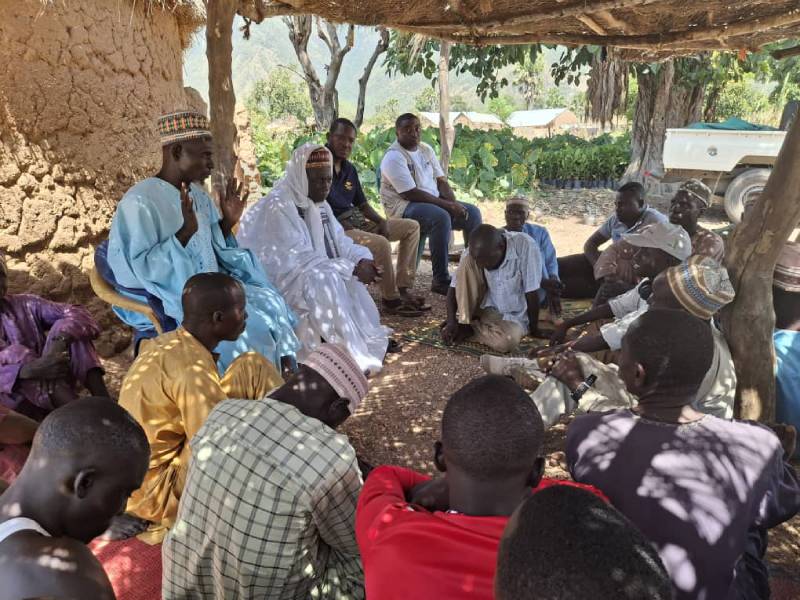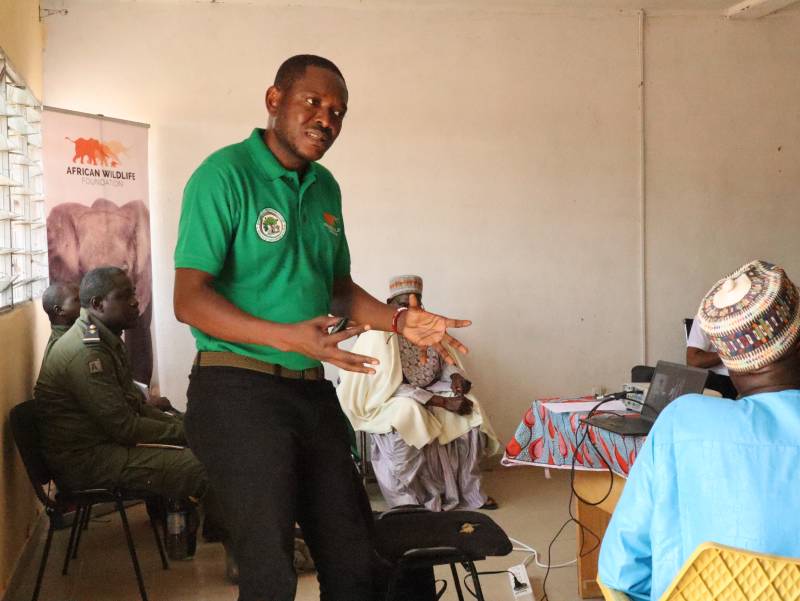Empowering Communities Through a Rights-Based Approach to Conservation

Dodo Moke, AWF's Senior Social Safeguards Officer, leading a training session in Faro, Cameroon.
In northern Cameroon’s Faro Landscape, near the border with Nigeria, Moussa Abdul reflects on how hunting once defined his community's livelihood. Over time, however, these practices led to overhunting and encroachment, depleting resources and biodiversity.
"While hunting once sustained us, it also kept us trapped in poverty, as the relentless exploitation of wildlife pushed endangered species toward extinction, leaving our community with limited options and no sustainable alternatives," Abdul reflected.
Spanning 3,300 square kilometers — roughly half the size of Yellowstone National Park in the United States — Faro National Park is a biodiversity hotspot. It is home to critically endangered species such as the Central-West African lion, African forest elephant, Lord Derby's eland, and one of the largest hippopotamus populations in Central and West Africa. Despite its ecological importance, the park faces severe threats from commercial poaching, transhumance (seasonal cross-border livestock movement), and climate change.
Integrating Conservation and Community Needs

Moussa Abdul at the Rural Resource Center in Tchamba, Faro, Northern Cameroon.
In 2017, the African Wildlife Foundation (AWF) launched conservation initiatives in Faro Landscape in collaboration with local communities, government agencies, non-governmental organizations, and the Garoua Wildlife School. AWF's approach integrates community needs with conservation goals, fostering a sense of shared responsibility.
To reduce reliance on hunting, AWF has equipped communities with business skills and sustainable livelihood options, including eco-tourism and agriculture. At the rural resource center in Faro, over 100 villagers have received training in sustainable agriculture, and AWF has supported 10 microenterprises.
"I've seen many hunters in my lifetime, but none were able to earn enough to build a house," said Hayatou Adji, the traditional chief of Voko village near the park. "In recent times, hunting is no longer seen as profitable."
In Tchamba village, AWF distributed three groundnut oil production machines funded by the European Union. These machines have helped communities generate income by producing and selling oil locally.
"We train households in business management and income generation," said Adamou Abubakar, AWF's community development officer. "This has led to lifestyle changes, with many viewing hunting as less viable."
Adji noted the impact these initiatives have had on his community. "We now understand the advantages of preserving our forests, which act as carbon reservoirs and improve our lives," he said.
AWF's holistic approach, in partnership with organizations like Noé and CIFOR-ICRAF, has empowered communities across the Faro landscape, helping villages adopt sustainable practices and reduce their dependence on environmentally harmful activities.

Dr. Youkouda Koeranga, traditional chief of Tchamba (in blue), participates in a training session in Faro, Cameroon.
"These initiatives have significantly improved lives," said Dr. Youkouda Koeranga, the traditional chief of Tchamba. "Many households can now afford three meals a day, which wasn't the case in 2017."
Implementing the Rights-Based Approach to Conservation
AWF is implementing a rights-based approach to deepen conservation impact. This approach prioritizes respect for local communities' rights while ensuring their active participation in protecting Faro's ecosystem. It aligns with international standards, emphasizing inclusivity and mutual benefit.
"The rights-based approach makes communities understand they are stakeholders in conservation. It empowers them to make decisions that greatly influence their future," said Dodo Moke, AWF's senior social safeguards officer.
Since 2019, AWF has trained 100 community scouts and eco-guards as part of its conservation efforts in Faro. Supported by European Union funding, these scouts patrol the landscape, provide data for anti-poaching operations, and enhance park security.

Dodo Moke, AWF's senior social safeguards officer, during a training session in Faro, Cameroon.
"This approach has delivered tangible outcomes," Moke said. "We introduced a complaints management mechanism that allows communities to report rights violations, thereby building trust between conservation authorities and local residents."
Abdul, now a community scout leader, emphasized the significance of this approach. "It reassures us that everyone's rights are respected," he said. "Faro's biodiversity is beautiful, and it's our responsibility to ensure this ecosystem thrives."
"Since AWF began its initiatives in Faro, I’ve witnessed changes in the lives of everyone involved, particularly the community scouts, trained and employed through these programs," Adji said. "Young men can now afford motorcycles and build homes, greatly enhancing the quality of life for many."
AWF's work in Faro National Park demonstrates how conservation and community development can coexist.
"Our efforts are not just about protecting wildlife. Integrating conservation with community development creates a model that can be replicated across Africa and beyond,” said Anthony Agbor, AWF's landscape director in Faro.
Learn more about AWF’s Integrated Strategies in Action in Faro.